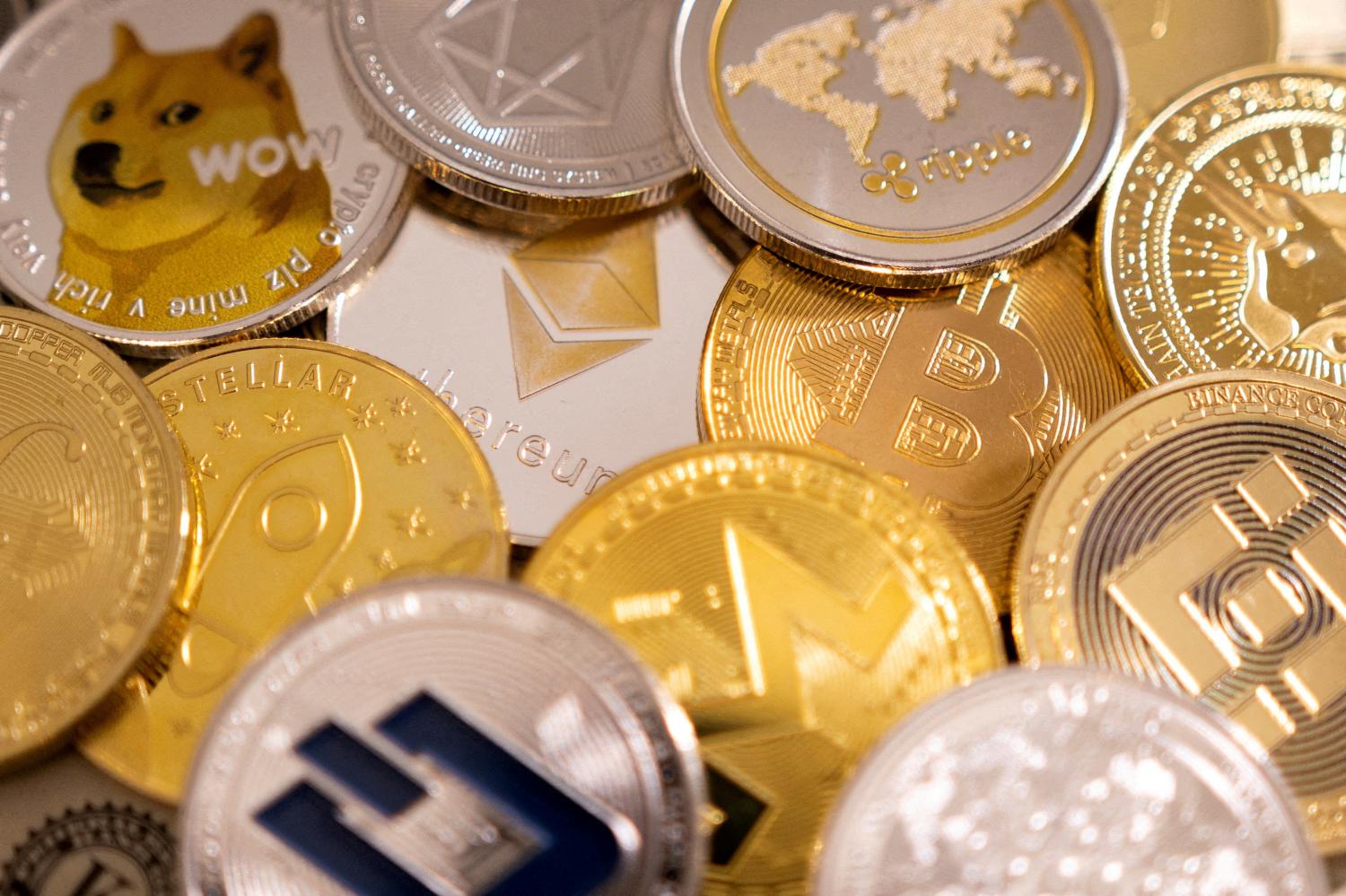The crypto competition is heating up

Representations of cryptocurrencies are seen in this illustration taken on Jan 24. The global cryptocurrency market has been declining since the beginning of this year. Reuters
After months of market volatility and falling prices, the digital asset landscape in Thailand is poised for intense competition, with new players lining up to enter the sector amid a tightening regulatory framework.
The global cryptocurrency market is expected to remain stagnant for the next 6-12 months as US interest rate policy and balance sheet cuts reduce market liquidity. Many investors are licking their wounds after several crypto platforms went bankrupt, while problems have hampered Thailand’s two main crypto exchanges, dampening investor confidence.
While the external market outlook is not as bright as last year, internal factors have also worsened the crypto climate, prompting a number of investors to significantly reduce their positions.
Investors were unable to withdraw their money from the Zipup+ platform after Zipmex, which operates in Singapore, Thailand, Australia and Indonesia, ran into a liquidity crunch after exposure to Babel Finance and Celsius Network deteriorated.
The collapse of Siam Commercial Bank’s (SCB) plan to buy into Bitkub Online (BO) has affected the price of Bitkub’s KUB coin. Bitkub was also hit with fines from the Securities and Exchange Commission (SEC) for failing to comply with the regulator’s rules for listing digital assets. BO and five members of the Digital Assets Selection Committee have each been fined around 2.5 million baht.
Data from the SEC indicates that the number of active crypto trading accounts in Thailand fell to 260,000 at the end of June, from 692,000 in January. Crypto trading values fell from 120 billion baht in January to 71 billion in June, with an average value of just 2.37 billion baht per day.
Last Thursday, the SEC moved to tighten its rules for advertising digital assets. From 1 September, for example, digital asset advertisements must not contain false, distorted or exaggerated information, or anything that could lead to misunderstandings among the public.
In addition, an advertisement must present investment risks and all necessary information, with balanced views for those interested in making investment decisions. Volatile cryptocurrencies can now only be advertised on official channels.
Poramin Insom, founder of Satang Corporation, said current crypto market conditions are similar to other risky assets, with the global economic slowdown and interest rate hikes having a significant impact.
The domestic crypto market has also been affected by regulatory issues and dampening investment sentiment. The market has been dominated by large players, while smaller players are at a disadvantage, he said.
New players are not necessarily financial institutions, but large companies, such as the alliance formed between Gulf Energy Development and Binance, the world’s largest crypto exchange platform.
Peeradej Tanruangporn, chairman of Thailand Digital Asset Operators Trade Association and CEO of Upbit Thailand, said the arrival of major new players will intensify competition in the crypto exchange business and may lead to consolidation of operators.

According to Coingecko.com, the cryptocurrency market capitalization peaked at $2.9 trillion in November 2021 and has fallen by 70% to around $1 trillion.
Crypto market
The global crypto market has been falling since the beginning of the year due to macroeconomic factors and concerns about liquidity tightening.
Attempts to tame inflation with a series of large US interest rate hikes have seen funds move from high-risk assets to the relative safety of the dollar market.
According to Coingecko.com, the crypto market capitalization peaked at around $2.9 trillion in November 2021, but has since fallen by 70% to around $1 trillion.
In Thailand, the number of active trading investors has continued to decline from about 260,000 in July.
Bitkub, Thailand’s largest crypto exchange, was affected by the collapse of SCB’s offer to buy a 51% stake for 17.8 billion baht.
Last November, the board of SCB Securities Co, a subsidiary of SCB X, approved the acquisition of BO from Bitkub Capital, but on August 25, both parties called off the deal, citing regulatory issues.
On August 30, the SEC fined Samret Wajanasathian, chief technology officer of Bitkub Blockchain Technology, for allegedly using inside information to purchase KUB coins in connection with SCB’s attempted acquisition of BO.
BO, a subsidiary of Bitkub Capital Group Holdings, remains the largest player in the market with a share of more than 90%, followed by Zipmex Thailand. The rest of the Thai market consists of smaller digital exchange platforms such as Satang Pro, Upbit, Z.ComEX and others from digital asset brokers such as Bitazza and Kulap.
Last Thursday, the SEC fined Singapore-based digital asset operator Zipmex 1.92 million baht for two violations of the Digital Asset Act. According to the SEC statement, Zipmex suspended all or part of its digital asset trading service from July 20 to 28 without complying with the rules, conditions and methods of trading.
From July 20 to August 25, Zipmex suspended its clients’ asset withdrawal service in Trade Wallet and Z Wallet, which the SEC said did not comply with professional standards.
With Bitkub and Zipmex stung by negative news, the state of the Thai crypto market has worsened. It remains to be seen whether the entry of major players such as the Gulf-Binance alliance convinces new investors to trade as volume remains low.
The Gulf-Binance alliance has not applied for a business license and the process may take some time.
Investing on an unregulated digital asset exchange involves high risk, as the SEC is unable to assist in legal proceedings and investors must bear the losses themselves if damage occurs.

Representations of cryptocurrencies Bitcoin, Ethereum, DogeCoin, Ripple, Litecoin are placed on the PC motherboard in this illustration taken June 29, 2021. REUTERS
The competition is increasing
Gulf Energy Development said it would increase its investment in blockchain ecosystems to diversify revenue sources, even as Thai regulators tightened oversight of fintech and related platforms amid a plunge in the value of many tokens. The alliance with Binance is expected to apply for a license in the third quarter of this year.
A crypto industry source who requested anonymity said new players backed by big companies are arriving, especially telecom firms that have both the technology and the customer base from fixed and mobile systems to increase user numbers.
The source is monitoring True Corporation to predict any transition to this business, as Advanced Info Service (AIS) is likely to join the Gulf-Binance partnership. Gulf currently owns around 46% of Intouch Holdings Plc, the parent company of AIS.
Upbit, which was co-founded by Charoen Pokphand (CP) group heir Chatchaval Jiaravanon, is a possible joint venture partner for True, the telecom giant controlled by CP’s Chearavanont family.
Bank entrance
SCB applied for three digital asset business licenses through its subsidiary SCB Securities: for a digital asset exchange, a digital asset broker for cryptocurrency and digital tokens.
SCB expanded its investments into technology companies and startups through the subsidiary SCB 10X, which is SCB’s holding company for technology investments.
SCB 10X established Token X, which holds an initial coin offering (ICO) portal license.
Even after SCB scrapped the deal with Bitkub Online, Thailand’s oldest lender still has the digital licenses.
Kasikornbank (KBank) entered the digital asset business through its subsidiary Kasikorn Business Technology Group, which invests in technology companies and startups.
KBank established another subsidiary, Kubix Digital Asset Cloud, which is licensed to be an ICO portal.
Krungthai Bank (KTB) entered the digital asset business through KT XSpring Co. Its joint venture Krungthai XSpring has a license to operate a digital asset broker, which is not yet operational.
KTB entered the digital business through its “Pao Tang” application, an open digital platform that can be accessed by more than 33 million people.
The state-owned bank also developed a Krungthai Gold Wallet service with MTS Gold, trading gold through the Pao Tang app.
Pao Tang offers digital distribution of corporate bonds through its app and has sold bonds for PTT Exploration and Production, Minor International and Sansiri.
Bank of Ayudhya also expressed interest in entering the digital asset business through its subsidiary Krungsri Finnovate, which owns 1% of Zipmex and invests in other technology firms and startups.


